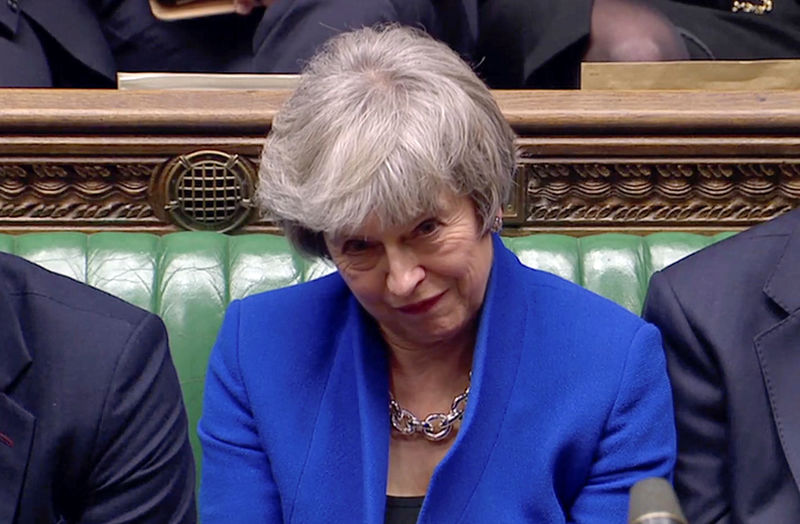By Kylie MacLellan and William James
LONDON (Reuters) - Prime Minister Theresa May won a confidence vote in the British parliament on Wednesday before proposing immediate talks with other party leaders in an attempt to break the deadlock on a Brexit divorce agreement.
Lawmakers voted 325 to 306 that they had confidence in May's government, just 24 hours after handing her Brexit deal a crushing defeat that left Britain's exit from the European Union in disarray.
With the clock ticking down to March 29, the date set in law for Brexit, the United Kingdom is now in the deepest political crisis in half a century as it grapples with how, or even whether, to exit the European project it joined in 1973.
After the results of the confidence vote were announced to cheers from Conservative lawmakers, May said she believed parliament had a duty and a responsibility to find a solution that would deliver Brexit.
"We will continue to work to deliver on the solemn promise we made to the people of this country to deliver on the result of the referendum," May said.
"I would like to invite the leaders of parliamentary parties to meet with me individually, and I would like to start these meetings tonight."
If May fails, the United Kingdom could face a disorderly "no-deal" Brexit, a delay to Brexit, or even another referendum on membership. Some critics said she was not budging from the deal that had alienated all sides in parliament.
COMPROMISE POSSIBLE?
"Before there can be any positive discussions about the way forward, the government must remove clearly, once and for all, the prospect of the catastrophe of a no-deal Brexit from the EU and all the chaos that would come as a result of that," opposition Labour leader Jeremy Corbyn said.
Earlier, Labour finance spokesman John McDonnell said May could eventually get a deal through parliament if she negotiated a compromise with his party - which wants a permanent customs union with the EU, a close relationship with its single market and greater protections for workers and consumers.
But her spokesman said it was still government policy to be outside an EU customs union while May, an initial opponent of Brexit who won the top job in the turmoil following the 2016 referendum, insisted Britain would leave the bloc as planned on March 29, leaving little time for a solution to be found.
Sterling
Tuesday's crushing defeat appears to have killed off May's two-year strategy of forging an amicable divorce in which a status-quo transition period would be followed by Britain operating an independent trade policy alongside close ties to the EU, the world's biggest single market.
There have been growing calls from pro-EU lawmakers from both her own party and opposition politicians for another referendum with an option to cancel Brexit. Labour has said it is ruling nothing out if it fails to bring May down.
Ever since Britain voted by 52-48 percent to leave the EU in June 2016, the political class has been debating how to leave the European project forged by France and Germany after the devastation of World War Two.
FEARS OF CATASTROPHE
Companies on Wednesday warned of catastrophic job losses and chaos at ports if there was no deal. Trade with the EU would then default to basic World Trade Organization rules, which many argue would disrupt innumerable manufacturing supply chains relying on rapid, friction-free trade.
Other members of the EU, which combined has about six times the economic might of the United Kingdom, called for discussion but indicated there was little chance of fundamental change to the deal May had negotiated. German Foreign Minister Heiko Maas said there was not much time left to find a Brexit solution and "the time for playing games is now over".
For the EU, already reeling from successive crises over debt and refugees, Brexit is possibly the biggest blow in its 60-year history, though its 27 other members have shown remarkable unity over Britain's exit.
While some EU leaders and many British lawmakers have suggested that Britain might want to change its mind, Britain's leaders are concerned that to stop Brexit could alienate the 17.4 million people who voted to leave.
Brexit supporters anticipate some short-term economic pain but say Britain will then thrive if cut loose from what they cast as a doomed experiment in German-dominated unity.

Opponents of Brexit say it is folly that will weaken the West, make Britain poorer and torpedo what remains of its post-imperial clout.